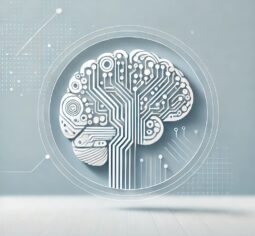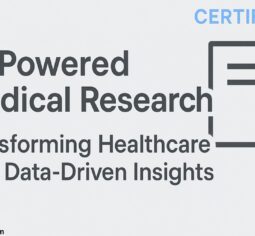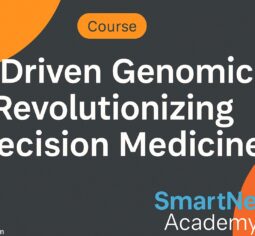Welcome to Neuroscience and AI Course: Master NeuroAI Fusion for Advancing Healthcare and Technology, an innovative and comprehensive course offered by SmartNet Academy. This course is designed for individuals eager to explore the intersection of neuroscience and artificial intelligence. As the world continues to embrace technological advancements, understanding how AI and brain science intersect is essential for professionals seeking to lead in the AI-driven future.
This course takes you on a journey to discover the principles of neuroscience and how they can inform the development of sophisticated AI systems. You’ll learn how insights from brain science can inspire AI models to mimic cognitive processes and make machines more intelligent and adaptable. You will also explore how AI technologies such as neural networks and deep learning replicate the functions of the human brain, enabling smarter decision-making and better problem-solving.
Through this course, we will also examine how AI is enhancing our understanding of the human brain, contributing to breakthroughs in areas such as brain-computer interfaces (BCIs), neuroimaging, and neuroprosthetics. Whether you are interested in neuroscience, artificial intelligence, or the dynamic integration of both, this course will provide you with a detailed understanding of this fascinating field.
With NeuroAI Fusion, you’ll gain insights into how both disciplines work together to shape the future of technology, from improving medical treatments to revolutionizing cognitive computing. Join us to delve into the world of NeuroAI and equip yourself with the skills to be at the forefront of neuroscience and AI advancements.
Course Overview: Exploring the intersection of Neuroscience and AI
This course offers a comprehensive journey into the fascinating world of Neuroscience and Artificial Intelligence (NeuroAI). By diving into the foundational principles of both fields, you will develop a deep understanding of how the human brain and AI models work together to push the boundaries of technology and healthcare.
Foundational Principles of Neuroscience and AI
The course begins by laying the groundwork for understanding the relationship between neuroscience and artificial intelligence. You will start with the basics of neuroscience, exploring the structure and function of the human brain. This includes:
-
Brain anatomy and neural networks: Discover the complex architecture of the brain, focusing on how neural networks work to transmit signals and process information.
-
Cognitive processes: Understand how cognitive functions like memory, attention, and perception influence the development of AI models designed to mimic human thought processes.
-
Neural influence on AI algorithms: Explore how neural processes inspire AI algorithm design, including the application of artificial neural networks that are based on the brain’s structure.
Through this foundational knowledge, you will gain insights into how brain science shapes AI systems and how AI models contribute to our understanding of neural functions in the brain.
Advanced AI Technologies Mimicking the Brain
Once you understand the core principles, we will delve deeper into advanced AI technologies and how they replicate brain functions. Topics include:
-
Deep learning: Learn how deep neural networks (DNNs) mimic the brain’s complex processing abilities to recognize patterns, process data, and make predictions.
-
Cognitive computing: Explore how cognitive computing uses AI to simulate human decision-making, focusing on AI’s ability to learn, reason, and problem-solve like the human brain.
-
Neural networks: Gain a clear understanding of how artificial neural networks are modeled after biological neural networks in the brain and how they are used for tasks like image recognition, speech processing, and natural language understanding.
These technologies form the backbone of modern AI, driving innovations in everything from healthcare to robotics, and are rooted in our understanding of the brain.
Applications of AI in Solving Neurological Problems
One of the most exciting aspects of this course is exploring how AI technologies are being used to solve neurological problems and improve brain function. You will learn about groundbreaking applications in healthcare and technology, including:
-
Brain-Computer Interfaces (BCIs): Explore how BCIs enable direct communication between the brain and external devices, aiding people with neurological impairments and offering potential in neuroprosthetics.
-
Neuroimaging techniques enhanced by AI: Understand how AI is improving neuroimaging techniques like fMRI and EEG to study brain activity in real-time, leading to better diagnostic tools and treatments.
-
Neurofeedback: Learn about AI-powered neurofeedback that helps optimize brain function and can be used for mental health treatments and performance enhancement.
These applications demonstrate how AI can help us solve complex neurological problems and make breakthroughs in understanding and treating brain disorders.
Practical Applications of NeuroAI Tools in Real-World Scenarios
By the end of the course, you will have a robust understanding of how brain science and AI intersect, and how these technologies can be applied in various real-world scenarios. You will be prepared to:
-
Conduct research in neuroscience and AI, leveraging NeuroAI tools to explore new avenues in both fields.
-
Apply AI in healthcare, particularly in neuroimaging, brain-computer interfaces, and neuroprosthetics.
-
Implement AI in neurofeedback systems for enhancing brain function, mental health, and cognitive performance.
You will have gained not only theoretical knowledge but also the practical skills to integrate NeuroAI technologies into research, healthcare, and various other fields.
Shaping the Future of NeuroAI
The course NeuroAI Fusion will equip you with an in-depth understanding of the dynamic relationship between neuroscience and AI, and how these two fields are working together to transform industries. By the end, you will be ready to take the next step in your career, applying NeuroAI in research, healthcare, and beyond.
AI Meets Neuroscience: The Symbiotic Relationship
In this course, you will explore how brain science and artificial intelligence (AI) are working in tandem to push the boundaries of what technology can achieve. The relationship between neuroscience and AI is not just one of inspiration; it’s a dynamic interaction where both fields are evolving in ways that complement each other. By understanding how AI algorithms are inspired by neural processes in the brain, you will gain a deeper appreciation of how AI mimics human cognition and helps solve complex real-world problems.
AI Algorithms Inspired by Neural Processes
One of the most fascinating aspects of AI is how it draws inspiration from neural processes in the human brain. Artificial neural networks (ANNs) are modeled after the interconnected neurons in the human brain, allowing AI systems to process information in a similar way. These networks consist of layers of artificial neurons that work together to recognize patterns, make decisions, and adapt to new information. Here’s how this process mirrors human cognition:
-
Neural network architecture: Just as the brain processes information through neurons that transmit signals, AI uses artificial neurons connected in layers to learn from data.
-
Deep learning: Similar to how the brain processes complex tasks, deep learning models are designed to handle multi-layered decision-making, learning from vast amounts of data to make predictions or identify patterns.
-
Cognitive functions: By replicating the brain’s neural processes, AI models can simulate cognitive tasks such as speech recognition, image classification, and natural language processing.
In this course, we will examine the intricate ways that neural networks are built to mimic the brain’s processing abilities, and how these models are revolutionizing fields such as image recognition, speech processing, and decision-making.
Neuroimaging Technologies Enhanced by AI
A key focus of this course is understanding how AI enhances neuroimaging technologies, providing real-time insights into brain activity. Neuroimaging, such as functional magnetic resonance imaging (fMRI) and electroencephalography (EEG), has traditionally been used to observe and analyze the brain’s electrical activity. However, the integration of AI tools is allowing for more precise and faster analysis, leading to significant advancements in brain science and neurological care.
-
fMRI and AI: fMRI is a powerful tool used to measure and map brain activity by detecting changes in blood flow. AI is applied to analyze fMRI data in real time, helping identify patterns associated with various cognitive and emotional states. This integration is transforming how we study brain function and mental health.
-
EEG and AI: EEG measures electrical activity in the brain. AI algorithms process EEG data, providing more accurate interpretations of brainwave activity and identifying potential neurological disorders faster and more effectively.
The combination of AI and neuroimaging has also accelerated research in fields like mental health and neurological disorders. These enhanced technologies allow for earlier diagnosis of conditions like Alzheimer’s, Parkinson’s, and schizophrenia, as well as improved treatment protocols.
Innovative Treatments in Mental Health and Neurology
As AI continues to enhance neuroimaging technologies, it opens the door for innovative treatments for both mental health disorders and neurological diseases. By leveraging AI, clinicians can develop personalized treatment plans that are based on more accurate, data-driven insights from brain scans. Some key areas of advancement include:
-
AI in neurofeedback: AI-powered neurofeedback allows therapists to provide real-time brain activity feedback, helping patients manage conditions like anxiety, depression, and ADHD.
-
Mental health diagnostics: AI enhances the ability to detect brain irregularities associated with mental health conditions, allowing for more targeted interventions.
-
AI-assisted rehabilitation: In neurological rehabilitation, AI tools are used to monitor and optimize recovery processes, particularly for patients with stroke or traumatic brain injuries.
These applications highlight how AI and neuroscience are not only helping us understand the brain better but are also providing innovative tools to treat and manage neurological and psychological conditions more effectively.
The Future of AI in Neuroscience
As AI continues to advance, the possibilities for integrating AI with neuroscience are virtually limitless. With each breakthrough in AI technology, there is a greater understanding of how the brain functions and how we can enhance cognitive processes. In this course, you will gain insights into the future of AI neuroscience, including the development of brain-computer interfaces (BCIs), neuroprosthetics, and AI-powered cognitive enhancement tools.
The future promises a new era where AI and neuroscience work hand in hand to improve healthcare, cognition, and human capabilities. By mastering these concepts, you will be prepared to contribute to groundbreaking research and practical applications that will shape the future of both fields.
Key Technologies at the Intersection of AI and Neuroscience
This course will take you through the cutting-edge technologies at the intersection of NeuroAI, showcasing how artificial intelligence is transforming both the healthcare and technology industries. You will explore how AI is not only helping us understand the brain more deeply but is also being used to enhance brain functions, develop assistive devices, and improve neurological health. Below are the key technologies that we will cover in the course:
Brain-Computer Interfaces (BCIs): Enabling Real-Time Communication
Brain-Computer Interfaces (BCIs) are one of the most exciting and impactful applications of NeuroAI. BCIs enable direct communication between the brain and external devices, allowing individuals to control technology with their thoughts. This technology has revolutionary applications, especially for individuals with physical disabilities or those recovering from neurological impairments. In this course, you will:
-
Learn how AI enhances BCIs: Discover how machine learning algorithms analyze brain signals and translate them into actionable data to control devices like prosthetics, computers, and communication aids.
-
Explore the role of BCIs in rehabilitation: Learn how BCIs are used in neurorehabilitation, helping individuals with stroke, paralysis, or amputations regain mobility or communicate more effectively.
-
Understand real-time brain-device interaction: Dive into the mechanisms of how real-time AI-powered interfaces interpret brain activity and enable more seamless interaction between the brain and external systems.
The course will cover real-world examples of BCI technologies in practice, focusing on their potential to change lives, enhance rehabilitation, and improve autonomy for individuals with severe disabilities.
Neuroimaging & AI: Enhancing Brain Activity Analysis
Neuroimaging techniques such as fMRI (functional magnetic resonance imaging) and EEG (electroencephalography) are essential tools in understanding brain activity. When combined with artificial intelligence, these techniques have become far more effective, providing real-time, precise analysis of brain functions. In this section of the course, you will:
-
Learn how AI enhances neuroimaging techniques: Discover how deep learning and other AI algorithms are being applied to neuroimaging data to improve the resolution and accuracy of brain scans, enabling faster and more accurate diagnoses.
-
Explore the use of AI in brain research: Understand how AI is transforming brain research, from studying mental health conditions like schizophrenia and depression to neurological diseases such as Alzheimer’s and Parkinson’s.
-
Examine real-time applications: Learn how AI-driven neuroimaging is used in real-time brain activity monitoring for mental health treatments and neuroprosthetic control.
The integration of AI with neuroimaging is opening new doors for more accurate and personalized treatments, while improving our ability to understand complex cognitive and neurological processes.
AI for Neurological Research: Accelerating Brain Science
AI-driven data analysis is becoming indispensable for neuroscientists who are tackling the complexities of brain functions and cognitive disorders. In this course, you will explore:
-
How AI is used in neurological research: Discover how AI models analyze massive datasets from brain scans, genetic data, and patient histories, enabling researchers to identify patterns that were previously impossible to detect.
-
AI in understanding cognitive disorders: Learn how AI is helping to uncover the underlying causes of neurological disorders such as autism, dementia, and multiple sclerosis, leading to earlier diagnoses and more targeted therapies.
-
Machine learning’s role in predicting outcomes: Gain insights into how machine learning is used to predict the progression of diseases, the response to treatments, and to discover new biomarkers for brain disorders.
AI’s ability to process complex datasets and identify patterns is revolutionizing neurological research, allowing scientists to accelerate discoveries and improve patient outcomes.
Neurofeedback and AI: Enhancing Cognitive and Neurological Health
Neurofeedback is a process that uses real-time data to help individuals control and optimize their brain activity. By pairing neurofeedback with AI, this technique has the potential to revolutionize treatments for various cognitive and neurological conditions. This section of the course will cover:
-
How AI enhances neurofeedback: Learn how AI algorithms analyze brainwave activity to provide personalized feedback, helping individuals regulate mental states, reduce stress, improve focus, and enhance cognitive performance.
-
AI in mental health treatment: Understand how AI-powered neurofeedback is used in treating mental health disorders such as anxiety, ADHD, and post-traumatic stress disorder (PTSD).
-
Cognitive enhancement and AI: Explore how neurofeedback combined with AI is used to enhance cognitive functions like attention, memory, and learning, making it a powerful tool for cognitive training.
With AI-driven neurofeedback tools, individuals can experience real-time feedback to optimize their brain function, leading to better mental health and improved cognitive abilities.
The Future of NeuroAI Technologies
The future of NeuroAI holds immense potential for transforming healthcare, research, and technology. In this course, we will also touch on future developments in AI-powered neurotechnology, including brain implants, cognitive enhancement technologies, and neuroadaptive systems. By mastering these cutting-edge tools, you will be equipped to contribute to the next generation of neurotechnological advancements.
This course will empower you with the knowledge to navigate the growing field of NeuroAI, preparing you to lead innovations in brain-computer interfaces, neuroimaging, AI for neurological research, and mental health treatments.
Practical Applications of NeuroAI
In this course, we will dive into the practical applications of NeuroAI, a cutting-edge field where artificial intelligence meets neuroscience to deliver innovative solutions in healthcare, assistive technology, and neurological research. The integration of AI tools with neuroscience has led to real-world advancements that are improving the lives of people with neurological disorders and enhancing brain science research. This course will provide a thorough exploration of some of the most impactful NeuroAI applications transforming industries today.
Assistive Devices: Enhancing Neuroprosthetics
AI’s application in assistive devices is one of the most prominent and promising areas of NeuroAI. Neuroprosthetics are artificial devices designed to replace or restore lost cognitive or motor functions. By integrating AI algorithms with brain-computer interfaces (BCIs), neuroprosthetics can be controlled through the user’s thoughts, offering significant improvements in mobility, communication, and quality of life for individuals with disabilities. In this course, you will:
-
Understand how AI enhances neuroprosthetics: Learn how AI models analyze neural signals and interpret them to control devices like prosthetic limbs, robotic exoskeletons, and assistive communication devices.
-
Explore BCI technology: Gain knowledge of how brain-computer interfaces enable direct communication between the brain and devices, making it possible for individuals with severe impairments to regain lost functionalities.
-
Examine real-world applications: Study examples where AI-powered neuroprosthetics have transformed lives, particularly in the rehabilitation of stroke survivors and amputees.
By the end of this module, you will have a solid understanding of how AI and neuroprosthetics work together to assist individuals with motor impairments and disabilities.
Mental Health Applications: AI in Therapy and Neurofeedback
AI is also making a significant impact in the mental health field by providing innovative treatments and support for mental health disorders. Through AI-driven neurofeedback systems and personalized therapy models, individuals with conditions such as depression, anxiety, and ADHD can receive more tailored and effective treatments. This course will explore how AI is applied in mental health treatments to enhance the therapeutic process. You will:
-
Learn about AI-based neurofeedback: Explore how AI-powered neurofeedback is used to monitor real-time brain activity and help individuals self-regulate their brain functions to improve mental well-being.
-
Understand AI in therapy: Discover how AI algorithms are being integrated into cognitive behavioral therapy (CBT) and other therapeutic models to provide personalized, dynamic treatment plans.
-
Apply AI for mental health diagnostics: Understand how AI tools are used to detect early signs of mental health issues, helping clinicians identify conditions like depression, schizophrenia, and bipolar disorder more quickly.
By incorporating AI into mental health care, treatments are becoming more personalized, efficient, and accessible, leading to better patient outcomes.
Personalized Medicine: Tailoring Treatments with AI
The use of AI in personalized medicine has revolutionized how we approach neurological disorders and other health conditions. By integrating AI models with neuroimaging data and genetic information, treatments can be tailored to each individual’s specific needs. This course will delve into how AI is applied to create customized treatment plans based on individual data, ensuring that therapies are more effective and targeted. Key learning outcomes include:
-
AI in treatment personalization: Understand how AI tools analyze brain scans, patient histories, and genetic information to craft personalized medical treatments for individuals with neurological diseases such as Parkinson’s and Alzheimer’s.
-
AI in drug discovery: Learn how AI models are being used in the development of new medications by simulating how drugs interact with brain cells and predicting their efficacy in treating specific conditions.
-
NeuroAI in rehabilitation: Discover how AI is enhancing neurorehabilitation by using brain activity data to personalize recovery plans and optimize brain function after traumatic brain injuries (TBI) or strokes.
With AI-driven personalized medicine, patients receive treatments that are specifically designed for their unique conditions, improving the precision and success of medical interventions.
Real-World Case Studies and Projects
In this course, you’ll engage with real-world case studies that demonstrate the practical applications of NeuroAI technologies. These case studies will showcase companies and research institutions that have successfully integrated AI with neuroscience for groundbreaking results. You’ll work on hands-on projects that simulate how AI can enhance neuroscience research or develop AI tools to improve neurological healthcare. These projects are designed to help you gain practical experience while applying what you learn to real-world challenges.
Why NeuroAI Fusion is Essential for the Future
The future of technology, healthcare, and artificial intelligence (AI) lies at the intersection of AI and neuroscience. This convergence, known as NeuroAI, is poised to revolutionize how we understand and interact with the human brain, leading to new frontiers in healthcare, neurotechnology, and AI applications. By mastering NeuroAI technologies, you can position yourself as a leader in this rapidly growing field, shaping the future of healthcare and AI-driven neuroscience.
Transforming Healthcare with NeuroAI
NeuroAI offers the potential to transform healthcare by improving diagnostics, personalizing treatment plans, and enhancing patient care. AI’s ability to process large datasets from neuroimaging, genetic information, and brain activity patterns provides clinicians with real-time insights to make faster, more accurate decisions. Through advanced machine learning models, AI can identify subtle patterns in brain data, predicting neurological conditions like Alzheimer’s, Parkinson’s, or schizophrenia long before traditional diagnostic methods. This early detection enables personalized treatments that are tailored to each patient’s unique brain structure and function.
-
AI-powered brain-computer interfaces (BCIs) are enabling patients with severe motor impairments to control devices directly with their thoughts, revolutionizing assistive technologies.
-
Neuroimaging technologies, when paired with AI algorithms, can create detailed brain maps that assist in understanding cognitive functions, detecting mental health issues, and improving mental wellness interventions.
-
Neurofeedback combined with AI enables individuals to self-regulate brain activity in real time, enhancing focus, emotional regulation, and overall cognitive performance.
By mastering NeuroAI, you will gain a deep understanding of how these advancements will shape the future of neurotechnology and healthcare, enabling you to contribute to innovative breakthroughs in personalized medicine and neurotherapies.
Pioneering the Next Generation of AI Applications
The integration of neuroscience and AI is unlocking entirely new possibilities for creating smarter, more adaptive technologies. AI systems, inspired by brain architecture, are capable of replicating cognitive functions like learning, decision-making, and problem-solving, making them powerful tools in fields like autonomous systems, robotics, and human-computer interaction.
-
Cognitive computing powered by deep learning models mimics the brain’s ability to learn and adapt over time, enabling AI to process complex data, identify patterns, and generate insights that were previously unattainable.
-
Neuro-inspired algorithms are being used to enhance AI models in various industries, including finance, marketing, and robotics, allowing for more efficient data processing, pattern recognition, and predictive analytics.
By gaining expertise in NeuroAI, you will be at the forefront of AI-powered systems that mimic human cognition, creating technologies capable of reasoning, decision-making, and problem-solving in ways that mirror human intelligence.
Shaping the Future of Neurotechnology and AI
The fusion of neuroscience and artificial intelligence is poised to redefine the way we live, work, and interact with technology. As NeuroAI continues to advance, its applications in healthcare, education, mental health, and more will create a future where technologies are not just tools but integral parts of how we augment human capabilities. From AI-driven neuroprosthetics that restore lost functions to brain-computer interfaces that connect the human brain to machines, the potential for NeuroAI to improve lives is limitless.
By mastering the technologies behind NeuroAI, you will position yourself as an influential player in the development of next-generation systems that push the boundaries of what is possible. Whether working in neurotechnology, AI research, mental health, or healthcare, your expertise will be in high demand as industries look to leverage the power of NeuroAI for improved patient outcomes, smarter systems, and more personalized experiences.
Leading the Charge in AI-Powered Neuroscience
The combination of neuroscience and artificial intelligence is a critical driver of innovation, and NeuroAI will continue to shape the future of technology and healthcare. As more industries turn to AI to understand the brain and enhance cognitive functions, the demand for experts in NeuroAI will only increase.
By mastering the fusion of neuroscience and AI, you will be equipped to lead groundbreaking projects that change the way we understand and interact with the brain. You’ll be able to drive AI-powered neuroscience innovations, positioning yourself as a leader in the next generation of intelligent systems that harness the power of brain science and artificial intelligence to transform industries and improve lives.
Certificate of Completion
Upon successful completion of this course, you will receive a Certificate of Completion from SmartNet Academy, validating your expertise in NeuroAI. This certificate will help you:
-
Showcase your expertise to potential employers or academic institutions.
-
Enhance your career prospects by opening up new opportunities in AI-driven healthcare, neuroscience research, and technology development.
-
Stand out in the rapidly growing field of NeuroAI, where both industries are continuously evolving and offering new career paths and projects.
By the end of this course, you will have the knowledge and tools to integrate AI with neuroscience in ways that will transform both fields. SmartNet Academy is committed to helping you stay ahead of the curve and lead the way in this revolutionary area of technology.






































